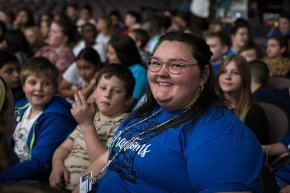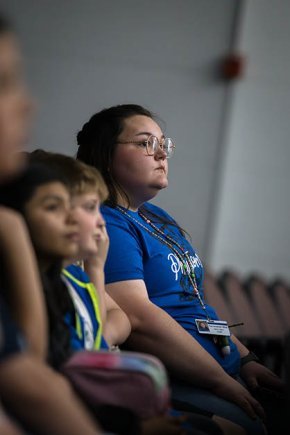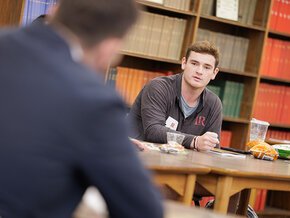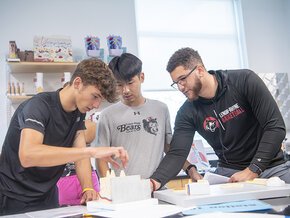
Putting the fun into reading fundamentals
For elementary educators, teaching reading ranks among the most challenging and important parts of the job description because students’ long-term success is tied closely to mastery of reading comprehension as well as enthusiasm. Now at the close of her fourth year leading her own classroom, Savannah Hill ’19 took a moment to reflect on how LR prepared her for success on both sides of literacy instruction.

“Reading and literacy were what really drove me to be a teacher,” said Hill, who teaches fifth grade at Hiddenite Elementary School in the Alexander County, N.C. public school system. “At times when you’re a kid growing up, you change what you want to be, but I always came back to teaching. I love to read, and I wanted to spark that love and interest for students.”
For years, the Lenoir-Rhyne School of Education has received accolades for training teachers who understand and implement the science of reading — a methodical approach that focuses on teaching students the skills necessary to consistently connect written language with sound and meaning.
“We studied the technical aspects of learning to read, then we put those ideas into practice tutoring students in reading a few days a week,” Hill explained. “The first step to engaging people with reading — or anything really — is making sure they have the skills to do it.”
LR’s elementary education program provided Hill access to another unique experience that would prepare her for the complex task of developing instructional materials for the elementary classroom and connecting them to literacy instruction.
“The Little Read is a required part of the coursework. We took a class in the fall of our senior year when we were doing our internships to get ready for student teaching in the spring,” said Hill.

Part of the university’s Visiting Writers Series, The Little Read distributes a selected work of children’s literature to students across Catawba and Alexander counties each year. Before they come to campus to meet the author and see a theatrical adaptation of the book, the elementary students engage with a curriculum designed around The Little Read — a curriculum designed by education majors such as Savannah Hill.
“The Little Read my senior year, 2019, was ‘The Turtle of Oman’ by Naomi Shihab Nye. We teamed with partners in class to develop lessons that connected the book with different subjects — language arts, social studies, math and science. For example, my partner and I were to look at the state educational standards for science and create lessons to connect those standards with the book,” said Hill.
With her partner, Hill consulted with classroom teachers to create activities and materials that would be engaging without creating additional work for the teachers whose classes were participating in The Little Read.
“It really prepared me for the job – creating lessons starting from scratch. And it opened my view of the content across all the grades, which is good because over the years you might get assigned to different grade levels depending on where you’re needed,” said Hill.
In 2023, Hill got to revisit The Little Read as the recipient of LR student-developed curriculum for her fifth-grade class as they read “The Turtle of Michigan,” Nye’s follow-up to “The Turtle of Oman.”
“I was really excited when we got the email at the beginning of the year because I really wanted to see the continuation of the character’s story,” Hill shared.
She also observed how programs like The Little Read have helped build enthusiasm among reluctant readers. “We talked to them about how fifth grade was chosen to read this book, and I told them about my experience, how the college students were developing activities for them, then there was the field trip to campus to see the play.”
Shortly before the field trip to campus, after all the lessons were finished, one of those reluctant students approached Hill. “He said, ‘I want to read that book again because it was so good.’ We’re helping them feel like they don’t have to read, they get to read.”
News & Events

Spring 2026 events feature a conversation on “On Tyranny,” a Mardi Gras concert highlighting American composers and a panel discussion about what binds a nation.
View More
Lenoir-Rhyne, Emory & Henry, and Mars Hill will launch a pilot program to strengthen leadership, engagement, and persistence among male students across campuses.
View More